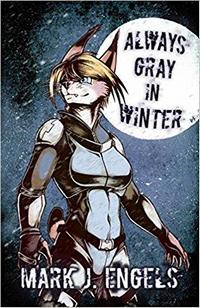 Always Grey in Winter
Always Grey in Winter
by Mark J. Engels
Kindle Edition, 184 pg.
A Thurston Howl Publications, 2017
Read: April 22 – 25, 2019
Let’s get this over and done with in a hurry, I’m in no mood to belabor things here. Let’s just rip off the bandage and just hope I don’t lose too much hair in the process.
Here’s the blurb from the author’s site:
The modern day remnant of an ancient clan of werecats is torn apart by militaries on three continents vying to exploit their deadly talents. Born in an ethnic Chicago neighborhood following her family’s escape from Cold War-era Poland, were-lynx Pawly flees underground to protect her loved ones after genetically-enhanced soldiers led by rogue scientist and rival werecat Mawro overrun her Navy unit in the Gulf of Oman. Pawly’s family seeks her out in a desperate gambit to return their ancestral homeland and reconcile with their estranged kinsmen. But when her human lover arrives to thwart Mawro’s plan to weaponize their feral bloodlust, Pawly must face a daunting choice: preserve her family secrets and risk her lover’s life or chance her true nature driving him away forever.
I honestly couldn’t have told you all of that on my own after reading the novel. I just re-read the pitch the author sent me a few months ago, and I learned more from that than I did the whole novel, too. Things make more sense now.
This is a problem. A huge problem. I’m a pretty good reader, I like to think. I’m even a pretty forgiving reader, willing to make connections that I think the author intended when they don’t do a good job on doing the job themselves. But, I just couldn’t with this book. I’m pretty sure I recognized the tricks of the trade Engels was trying to employ, the techniques he was using to keep this from being over-expository, or too info-dumpy. I applaud the tricks and techniques. When used correctly.
Those last three words are the key. Exposition is your friend. Yes, it can be overdone. Yes, it can be abused. It can be relied on too heavily. But it can’t be ignored if you actually want to communicate to your audience.
I’m just going to give bullet points for the rest of this:
- If you have to resort to all caps to express your character’s emotions, you need to write better dialogue.
- If you have to use that many exclamation points to express your character’s emotions, you need to rewrite your dialogue. Nobody yells/screams all the time in conversations.
- I spent so much time reading scenes trying to figure out where and when they took place that I eventually just gave up, assuming I’d figure it out eventually.
- A related note: there was a flashback sequence that I couldn’t tell when it ended and returned to the present.
- The characters weren’t characters, they were names attached to pronouns and occasionally to family relations. I honestly couldn’t tell you what separated some of them from each other. Everyone had the same personality, as far as I could tell (okay, I’m being a tad hyperbolic here…but not much)
- Did I mention that exposition can be your friend?
- There was no conclusion, no point. Things just ended. It was, as someone said, much ado about nothing.
- This is a 184 page book. It took me 4 days to read. I just wasn’t interested past the first chapter when it stopped making sense, it didn’t hold my attention, my mind kept wandering and I had to force myself to read it.
It seems to me that Engels had a very clear idea of what he was trying to accomplish, he knew his story and his characters. I don’t think he communicated any of it on the page. I’m seeing a lot of 4 and 5 star reviews out there, so clearly there’s a lot of people who’ll think I’m out to lunch. But, I just don’t see anything redeeming about this at all — and I like to think I go out of my way to find positives in every book I talk about. I’ve got nothing here.
Disclaimer: I received this novel from the author in exchange for my honest opinion, and I really wish I didn’t have to give it.
—–

![]()



Bookstooge
Oooooooohhhhh, BURN! I like it

wittysarcasticbookclub
One thing I love about your blog: you are always unflinchingly honest.
I hope your next read is better!
HCNewton
Oh, I assure, you I flinched a lot writing this! (and cut most of those lines) – and yes, the next read was better. Just trying to find the time to gush over it.
wittysarcasticbookclub
It’s always nice when you get a book you can gush over, especially after reading something so bad.
Ola G
Love the disclaimer!